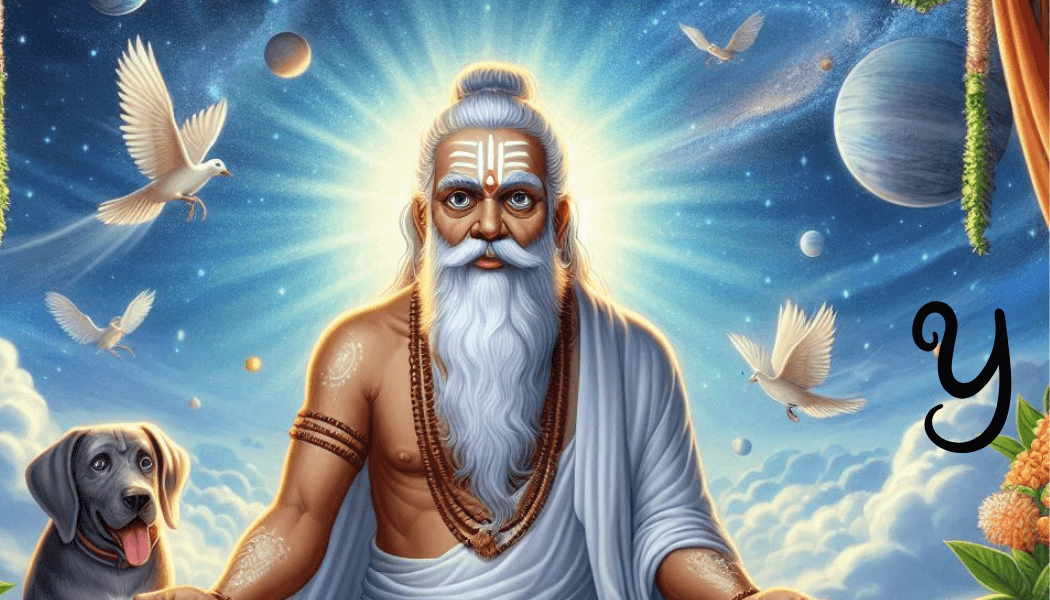Check the theme here: Pandava Mahaprasthana
***
Arjuna adjusted the arm of a five-year-old girl as she stood in her position to aim the arrow. She reminded him of Parikshit and young Janamejaya.
“Now shoot.” He said.
The girl pulled the bowstring taut and released the arrow. It whizzed through the air and hit the outer circle on the target board.
“I failed.” She murmured, tears pooling in her large brown eyes.
He straightened her arm and replied. “So what? You try again. You practice until you hit the center every single time. If it takes a year, so be it.”
She looked at him with hope. “You think I can?”
“I know you can.”
She gave him a wide grin, one that reminded him of his dead sons when they were kids. He and his brothers took pride in training the lads since they could walk. Now, none of them were alive; not even his grandson, Parikshit. Arjuna hoped his great-grandson would break the pattern. How many deaths could a broken heart bear?
With a soft sigh, he patted the girl’s arm and went to sit on the hay bale on the side. It had been around two years since they moved to their cozy little ashram on the outskirts of Anga. People from around the world belonging to mixed communities settled in this kingdom and made it their own. It reminded Arjuna of Indraprastha when they built it decades ago.
The young ones approached him and Bhima to train them in warfare, saying they couldn’t find gurus with such experience. Soon, all five brothers became acharyas and conducted daily lessons. It was Draupadi’s idea to include girls as young as four in archery and wrestling.
“With kali yuga approaching, it would help the girls to be self-reliant.” She said.
They agreed, knowing it was the best way to keep themselves occupied and share the knowledge with others. That didn’t mean grief wouldn’t catch him unawares like it did that day. The news of his grandson’s death had devastated him and others. They were stunned when an ascetic informed them about it.
***
“This is perfect!” Yudhistira declared when they reached the forest clearing close to the borders. It gave them the much-needed privacy but was also accessible from the nearby villages. The open area was extensive enough for a hut and a fence.
“We can even grow a few vegetables,” Sahadeva said as he walked along the perimeter marked by the trees.
The dog barked in excitement as it went sniffing from one tree to another.
“Look at him marking his territory already!” Bhima guffawed.
They all laughed and got to work. Draupadi picked up the stones and set them aside as Arjuna and Nakula measured the distance to mark the area for the hut.
In the next two days, they made the place their new home.
“I like it here,” Draupadi said, smiling at Arjuna. He wrapped an arm around her shoulder, and she leaned into him with a contented sigh.
They sat in silence, listening to the sounds in the forest. Draupadi held the peacock feather he found earlier in their journey. She twirled it between her fingers.
“I miss him so much.” He whispered into her hair.
She nodded in response. “Not a day goes by when I don’t think of him. He gave us everything… without him, we wouldn’t be here, with Parikshit healthy and alive, ruling Hastinapura like an experienced man. Only Krishna could revive a stillborn child.”
Arjuna agreed. “I wonder how he and our daughter-in-law are.”
“And little Janamejaya, though he wouldn’t be a little boy anymore!”
“He would be fourteen. They might have crowned him as the prince heir.” Arjuna calculated.
Draupadi agreed. “With Subhadra and Uttarā to guide him, he will become a fine man, like his great-grandfathers.”
“That’s one thing we don’t have to worry about.”
Before Draupadi could reply, they heard strained voices coming their way. She straightened, and they stood together.
“Arjuna…” Yudhistira said, looking pale and weak as a worried young ascetic held his arm.
Arjuna rushed to his older brother. “What happened? Are you hurt?”
Draupadi wiped Yudhistira’s face with her pallu. “Breathe, Maharaja. Come and sit.”
They led Yudhistira to the dead trunk Bhima placed near the hut as a makeshift seat.
The ascetic hovered, looking uncertain. Draupadi handed him and Yudhistira a tumbler each. While his brother held it in his trembling hands, the rishi gulped a few mouthfuls.
Turning to Arjuna, he said, “I apologize to be the bearer of bad news.”
“Please, just tell us what it is,” Draupadi whispered, gripping Yudhistira’s upper arm in fear.
“Raja Parikshit is no more. He was… killed by Takshaka.”
“What!”
“But…”
Arjuna felt dizzy. He let Draupadi and the ascetic lower him to sit beside Yudhistira, who hadn’t uttered a word so far.
Fortunately, Bhima and the twins returned, laughing about something. Arjuna saw their laughter cut off midway as they sensed the atmosphere.
Bhima went to Draupadi, who was wiping her eyes. “Maharani…”
“Parikshit is dead,” Arjuna said. His voice sounded strange to him. Was he the one speaking, he wondered.
“How?”
“That can’t happen! He is a strappy lad. Didn’t he win the war when Magada’s raja attacked last year?” Nakula cried.
They all clung to each other, bewildered by the news.
“Rishi Karuna, please tell them what you shared with me!” Yudhistira requested the young ascetic.
He nodded and took a deep breath. “Raja Parikshit went for a pleasure hunt one day. He got separated from his soldiers and walked deep into the forest. Tired and thirsty, he saw an ashram and went inside to ask for water and information. However, an old rishi was in mauna tapasya. The king lost his temper. He placed the dead skin of a snake on the rishi’s shoulders and stormed off.”
Draupadi gasped. “O Parikshit!”
Arjuna knew what she was thinking. It was on all their minds, too—they taught him better than that.
Rishi Karuna continued. “While the old rishi understood and forgave the king, his son, Sringin, was furious. He cursed that Raja Parikshit would die of snakebite in a week. The older rishi sent his disciple to alert the king since there wasn’t a way to change or break the curse.”
“What did Parikshit do?” Sahadeva asked.
“The king accepted the message and sent his regrets about losing his cool the previous day. He crowned Prince Janamejaya as his heir. The ministers got a single long tower erected for the king to stay. It had one door and no windows. Healers and rishis came every day, offering help. On the seventh day, Takshaka entered the tower by hiding as a worm in a fruit basket, and when he got a chance… he killed the king.”
“This is my fault!” Arjuna sobbed into his hands. He knew it was his past actions that haunted his grandson.
When Krishna and he burned the Kandavaprastha forest for Agni, Takshaka was elsewhere. However, his wife perished in the fire, but she saved their son, Asvasena. During the war, when Arjuna faced Karna on the seventeenth day, Asvasena disguised himself as Karna’s arrow and flew at Arjuna with a vengeance. Krishna saved him by pressing the chariot’s wheel into the soggy earth. The Naga hit Arjuna’s diadem instead, the one he got from Indra, his birth father. He then killed Asvasena to prevent a second attack.
“Of course, it is not!” Bhima shot back, slapping Arjuna on the back.
Yudhistira nodded. “Bhima is right, Arjuna. It’s not your fault. It’s nobody’s fault but a series of impulsive actions that led to this disaster. If not Takshaka, some other Naga would have killed him because of the curse.”
“How… are the others? My daughter-in-law… Subhadra…” Draupadi asked, her voice breaking.
“They are coping, Devi. It had been three months since this happened. The rishis say Janamejaya can rule the kingdom despite his age. They plan to get him married when he reaches sixteen years.”
Arjuna nodded, only half-listening to the details. He couldn’t stop thinking about the unwanted deaths in his family. His father, Pandu, got cursed on a similar pleasure hunt and died when the brothers were young. Then, their sons died in the war. When they thought everything was fine, their grandson got killed in his early 40s.
Was there a pattern they needed to break? Why were he and his brothers an exception? Was it because they suffered in other ways? Was it because their mother made them promise to never hunt for pleasure?
“We should have done what Maa did.” He whispered.
“Huh… Oh, yes! We should have.” Nakula murmured, shaking his head and wiping his tears. “Pleasure hunting never did us any good, except for our ancestor, who found a wife.”
Lost in thought, they mourned Parikshit’s untimely death. Kala was such a strange thing! Here they were in their eighties, living in a forest, and their hearty young grandson traveled to swarga before them!
The rishi stayed with them that night, doing his best to bring them solace by sharing stories from his travels.
***
“Two years. Janamejaya will be married now.” Arjuna said to himself. He hoped the lad learned from his elders and didn’t repeat the same mistakes. Maybe he could send a message, though they weren’t supposed to. Once they renounced everything, they weren’t to have any connection or interaction with their family or kingdom. He would talk to Yudhistira.
“I did it!” The little girl shrieked and jumped in joy.
Arjuna looked up to see the arrow right at the center of the board. The girl danced toward him, swinging her bow and giggling.
He smiled and let her hug him. Her innocent celebration eased his pain. Every child he trained was like his own. He would embrace whatever little happiness he found in life.
***





Each and every post reveal an interesting aspect of Mahabharata. You weave magic with every character you portray. A right blend of emotions, fantastic story telling and lovely expressions. Waiting every day to read more❤️
Thank you so much, Bhavna! ❤️
The Rishi became an interesting character to this series. I would like to know more about him in your upcoming chapters. Meanwhile, ““With kali yuga approaching, it would help the girls to be self-reliant.” She said.” Did it really happen even for the mildest of actions? I don’t think so.
The rishi is just a traveler/ messenger, dear. His role is over.
That part was my addition! 😉
I am not familiar with the Mahabharata though I have of course heard of the epic story – an interesting vignette. I am glad he found pleasure in the little girl’s achievement.
Visiting from A to Z https://anneyoungau.wordpress.com/
Thank you, Anne!
“Parikshit, the king who gambled with his fate” is such a foreboding line, isn’t it? It shows essence of his impulsive decision that led to his downfall and well somebody should’ve listened. Sigh!
Thank you so much, Malini. 🙂 Yes, he should have known better.
Permalink